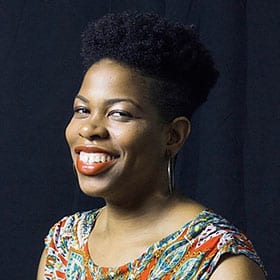Research Programs Manager
University of Michigan School of Nursing
FOCUS
Renée Pitter’s larger vision for building a Culture of Health is to revolutionize training for clinicians by moving away from a disease-based approach to a more salutogenic one, training clinicians to see their patients as the experts in their own bodies and the clinicians as the experts in the field. Our current system is disease-based, and Renée would like to change that model by bringing a more diverse set of candidates to the table, with a variety of lived experiences. It is for this reason that she has decided to focus on workforce development and upskilling within clinical healthcare roles, with a specific focus on registered nurses and setting them on a career path to well-paying healthcare jobs.
Renée’s research study is focused on the beginning of the healthcare worker pipeline going from technical staff (certified nursing assistant) to clinician (registered nurse), an example of a pivotal role in healthcare career advancement. Her initial research will focus on support and barriers that black CNAs face in pursuing a career in nursing, studying the path to RN. In order to build out this program, she seeks funding and partnership with foundations and other funders, workforce development organizations (focused on skilling and upskilling workers), health systems, other employers, policymakers, colleges, and other nursing training programs. She plans to connect with others in the health sector, such as pharmacy, insurance companies, and retailers.
This requires a perspective shift, making health and medicine more holistic and inclusive. When it comes to workforce development and upskilling, primary barriers for black individuals are finances and access. There are small changes that can be made to make career development more accessible to individuals with a great deal of experience and on-the-job training within the healthcare fields. As we enter yet another era of change within the healthcare landscape, Renée’s leadership and vision are necessary to ensure that these changes and improvements to our system are administered equitably.
STRATEGIC INITIATIVE: Black Clinician Pathway Survey
My project will address the inequity in the number of black clinicians. I will explore career pathways for healthcare providers as a cross-sectional, mixed methods research study. My research question is: What are the experiences, barriers, and facilitators for marginalized black individuals in climbing the clinical career ladder? For example, what is required for a black nursing assistant to become an RN? I will survey 200 healthcare workers, six workforce development organizations, and employers. Surveys will be followed up by qualitative interviews. Data will be collected using surveys and interviews, and it will be collected and analyzed. Research outcomes will be communicated through published articles and a final report. The findings of my research will fill existing gaps in healthcare provider education and career pathway equity. Our population focus is black individuals who are currently employed in entry-level health careers. The study will be national. Committed partners include the University of Michigan and Corporation for a Skilled Workforce. Ideal partners include Henry Ford Hospital, Michigan Medicine, Wayne, Washtenaw and Schoolcraft community colleges, Focus Hope, Detroit at Work, Project Quest, and Upskill.
MORE ABOUT RENÉE
Renée is a first-generation black Jamaican-American. Born and raised in Evanston, Illinois, she was surrounded by a rich diversity of black diasporic cultures. However, she quickly learned how race and racism in America impact black people of all ethnicities, with common experiences and outcomes. These foundational experiences and others have made her passionate about health equity, who we train as health providers, and how we do so.
Click here to watch Renée’s Legacy Project video.
RENÉE’S WORK AND VISION

